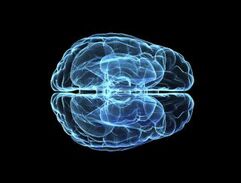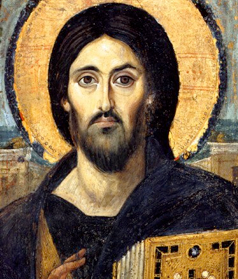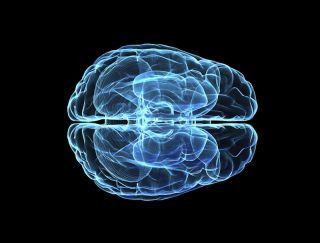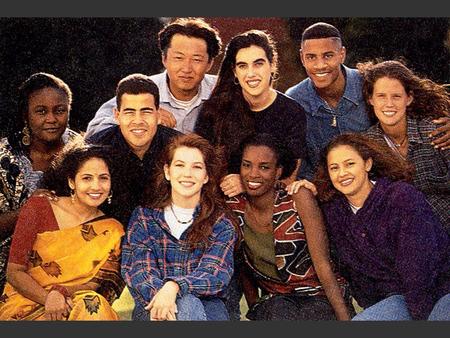“Philippians 2:5: “Let the same mind be in you that was in Christ Jesus.” The words call us up short as to what we are actually supposed to be doing on this path: not just admiring Jesus, but acquiring his consciousness.”
― Cynthia Bourgeault, The Wisdom Jesus: Transforming Heart and Mind
In those days John the Baptist appeared in the wilderness of Judea, proclaiming, “Repent, for the kingdom of heaven has come near.” - Matthew 3:1
From that time Jesus began to proclaim, “Repent, for the kingdom of heaven has come near.” - Matthew 4:17
Jesus came to Galilee, proclaiming the good news of God, and saying, “The time is fulfilled, and the kingdom of God has come near; repent, and believe in the good news.” - Mark 1:14&15

Where Does this "Bigger Mind" Stuff Come from?
Jesus.
Seriously.
It comes from looking at how Jesus started his ministry as related in the Gospels, the first four books of the New Testament of the Bible. It also comes from a careful look at what Jesus sought to accomplish and inspire in the lives of the people who followed him, and the people he happened upon in life.
The quotes above taken from the Gospels of Matthew and Mark provide the first clue about the Bigger Mind. Mark begins with the following:
As it is written in the prophet Isaiah,
“See, I am sending my messenger ahead of you,
who will prepare your way;
the voice of one crying out in the wilderness:
‘Prepare the way of the Lord,
make his paths straight,’”
John the baptizer appeared in the wilderness, proclaiming a baptism of repentance for the forgiveness of sins.
Notice that Mark reads, “a baptism of repentance.” It doesn’t say, “John was baptizing after the people repented.” It was a baptism of repentance. Let’s pause a moment and look at that word, “baptism.”
Jesus.
Seriously.
It comes from looking at how Jesus started his ministry as related in the Gospels, the first four books of the New Testament of the Bible. It also comes from a careful look at what Jesus sought to accomplish and inspire in the lives of the people who followed him, and the people he happened upon in life.
The quotes above taken from the Gospels of Matthew and Mark provide the first clue about the Bigger Mind. Mark begins with the following:
As it is written in the prophet Isaiah,
“See, I am sending my messenger ahead of you,
who will prepare your way;
the voice of one crying out in the wilderness:
‘Prepare the way of the Lord,
make his paths straight,’”
John the baptizer appeared in the wilderness, proclaiming a baptism of repentance for the forgiveness of sins.
Notice that Mark reads, “a baptism of repentance.” It doesn’t say, “John was baptizing after the people repented.” It was a baptism of repentance. Let’s pause a moment and look at that word, “baptism.”

The original Greek word, baptisma, means "to immerse." It has the same sense and uses of the English word, immerse. For instance, have you ever immersed yourself in a good book? You were baptizing yourself in a that book. It doesn’t mean “to dunk somebody in water.” It simply means to immerse. But, I do have to say, there is something powerfully dramatic about being immersed in water. I remember when I was young, my mom taking us to swimming lessons. But I could just never get the hang of things. I didn’t like putting my head in the water, and the whole stroke, turn your head, take a breath, stroke thing just wasn’t going to happen. Several summers went by like this.
Then finally, one summer at Boy Scout camp, we were at Warm Lake in Idaho, and I was taking swimming lessons along the lakeshore. I finally plunged myself in the water and glided along the bottom for about three seconds. But it was amazing! I felt the power of the water all around me, I felt like a fish, and suddenly the whole swimming mystery was solved. Total immersion in the experience changed everything.
This is what John is talking about. New life doesn’t happen by just wishing for it. You have to jump in, full-bodied. John is talking about a life immersed in the power and presence of God. Water immersion symbolizes this. Jesus will come to immerse them in the power of the Spirit. John is all about preparing for this immersion in the Spirit. We have to prepare ourselves for this. How? By telling the truth about our lives – confessing our sins is the Biblical phrase – and how off the mark we are, how off-path we have wandered, how lost and confused, how injured and hurt, how self-centered and hurtful we are. John preaches a baptism of repentance – an immersion in this self-examination, telling the truth, and starting over.
Now we need to pause once again and look at the next word, “repentance.” The original Greek is metanoia, which literally means to change one’s mind, to change the direction of one’s mind, and thus one’s life. In fact, metanoia also translates as “beyond the (normal) mind,” and the force of the verb indicates going beyond our normal consciousness or way of thinking into a deeper, bigger mind, the mind of Christ is what Paul calls it in Philippians. Metanoia, or repentance, then, means redirecting our lives from our small self-centered minds into the bigger mind of God. John preached about immersing oneself in repentance, or metanoia.
John says Jesus will come to immerse us in the power of the Holy Spirit.
So, Jesus comes down to the River Jordan to meet John. If you are like me, you probably ask, “Why did Jesus have to repent?” But remember, metanoia means to move into a bigger mind in order to start over, and Jesus comes to symbolically demonstrate that he embraces this bigger mind of God. In essence, he is embracing his divine nature, and his divine mission to show us a path to God, which is a consciousness of God, a perspective of life based upon the perspective of God.
Then finally, one summer at Boy Scout camp, we were at Warm Lake in Idaho, and I was taking swimming lessons along the lakeshore. I finally plunged myself in the water and glided along the bottom for about three seconds. But it was amazing! I felt the power of the water all around me, I felt like a fish, and suddenly the whole swimming mystery was solved. Total immersion in the experience changed everything.
This is what John is talking about. New life doesn’t happen by just wishing for it. You have to jump in, full-bodied. John is talking about a life immersed in the power and presence of God. Water immersion symbolizes this. Jesus will come to immerse them in the power of the Spirit. John is all about preparing for this immersion in the Spirit. We have to prepare ourselves for this. How? By telling the truth about our lives – confessing our sins is the Biblical phrase – and how off the mark we are, how off-path we have wandered, how lost and confused, how injured and hurt, how self-centered and hurtful we are. John preaches a baptism of repentance – an immersion in this self-examination, telling the truth, and starting over.
Now we need to pause once again and look at the next word, “repentance.” The original Greek is metanoia, which literally means to change one’s mind, to change the direction of one’s mind, and thus one’s life. In fact, metanoia also translates as “beyond the (normal) mind,” and the force of the verb indicates going beyond our normal consciousness or way of thinking into a deeper, bigger mind, the mind of Christ is what Paul calls it in Philippians. Metanoia, or repentance, then, means redirecting our lives from our small self-centered minds into the bigger mind of God. John preached about immersing oneself in repentance, or metanoia.
John says Jesus will come to immerse us in the power of the Holy Spirit.
So, Jesus comes down to the River Jordan to meet John. If you are like me, you probably ask, “Why did Jesus have to repent?” But remember, metanoia means to move into a bigger mind in order to start over, and Jesus comes to symbolically demonstrate that he embraces this bigger mind of God. In essence, he is embracing his divine nature, and his divine mission to show us a path to God, which is a consciousness of God, a perspective of life based upon the perspective of God.

The path of Jesus is nothing less than a path into a bigger mind, an expanded consciousness, the metanoia John preaches. Our minds literally have to be changed. But this is no easy task. Anyone trying to escape the clutches of addiction or trying to heal from an abusive upbringing, or recover from PTSD knows that “changing one’s mind” is not like changing the sheets or changing one’s clothes. It actually entails changing the very quality and content of one’s mind, and changing the configuration of the neurons in the brain. It involves developing a new mode of thinking and perceiving the world. It involves literally an expansion of consciousness. Paul called it having the mind of Christ, Jesus called it the Kingdom or Realm of Heaven (or God) that is within us and in our midst.
This is what Jesus came to help humanity realize and develop into. But there are a lot of things that have to be deconstructed, taken apart, disassembled, in order to be rebuilt and reconfigured in our mental landscape. This is the work of the Spirit within us. And that is what Jesus immerses us in – the power of the Holy Spirit. And this transforms us. It transforms our direction in life, it transforms our focus in life, it transforms the world around us by the things we do, and it transforms our very reality.
This is what Jesus came to help humanity realize and develop into. But there are a lot of things that have to be deconstructed, taken apart, disassembled, in order to be rebuilt and reconfigured in our mental landscape. This is the work of the Spirit within us. And that is what Jesus immerses us in – the power of the Holy Spirit. And this transforms us. It transforms our direction in life, it transforms our focus in life, it transforms the world around us by the things we do, and it transforms our very reality.

Moving into the Bigger Mind Requires Disentangling Our Minds
This whole repentance/conversion thing is not as simple as it appears. Even if one goes with metanoia meaning a change of mind (which still can have levels to what that means), even changing one’s mind so that one’s behavior is significantly changed is no easy task. Our minds and brains have been literally shaped and formed by everything around us: our language, our every interaction growing up, what we watch constantly on TV or movies, or on our computers, the steady stream of stuff that comes to us on Facebook or Twitter or SnapChat or any of a dozen social media. All of this creates a form of mind that is self-focused, prone to consider violence as a solution to most problems, commodity and acqusitionally-oriented, and, in our culture, obsessed with sex.
The metanoia Bigger Mind of Jesus entails changing the very quality and content of one’s mind, and changing the configuration of the neurons in the brain. It involves developing a new mode of thinking and perceiving the world. It involves literally an expansion of consciousness. Paul called it having the mind of Christ, Jesus called it the Kingdom or Realm of Heaven (or God) that is within us and in our midst. It is a quality of human interaction that grows out of an awareness of how we are connected and related to one another and to all things in contrast to a perception of disconnectedness, separation, and individual isolationism.
This is what Jesus came to help humanity realize and develop into. But there are a lot of things that have to be deconstructed, taken apart, disassembled, in order to be rebuilt and reconfigured in our mental landscape. This is the work of the Spirit within us, and we have to consciously disentangle ourselves from the mental hooks and lines that our life in this world have embedded in our minds.
In order to extricate ourselves from the deep psychological, emotional, and behavioral entanglements of these systems, we use the scalpel of truth-telling and inquiry into social and psychological systems that are oppressive, dysfunctional and destructive. A system operates by being an all-encompassing complex of factors, including values, educational processes, religious teaching, popular culture, political and military control, economics, and legal structures. As we work to dismantle and disentangle ourselves from these maladaptive and destructive systems, we begin by analyzing and understanding how these systems operate and how they infect our hearts and minds. This is the first step for moving into the Next, Bigger Mind.
In order to understand how these systems function beneath our level of conscious awareness, think of what it is like to be a fish whose entire life is lived immersed in water. Everything about you as a fish is adapted to living in water. Gills have evolved in order to filter out oxygen dissolved in water. Your musculature and body shape are designed to move you through water. In fact, you are only aware of water as the normal medium in which you live, move, and have your being.
Systems are the water in which we as human beings live, move, and have our being. Systems have shaped our thought processes, our desires, our intentions, and our perceived needs. Systems determine our value, and devalue us if it suits the purposes of the system and the interests served in the perpetuation of the system. Telling the truth about how systems operate as well as understanding the nature of these systems is vital in order to begin disentanglement. Here is a list of the major maladaptive Systems that have a grip on us:
Next: Read about JP21 and the Bigger Heart.
Click on the images below to read about JP21-BiggerMind; JP21-Bigger Heart; JP21-Bigger World; JP21-Bigger Life; JP21-Way of Ways.
This whole repentance/conversion thing is not as simple as it appears. Even if one goes with metanoia meaning a change of mind (which still can have levels to what that means), even changing one’s mind so that one’s behavior is significantly changed is no easy task. Our minds and brains have been literally shaped and formed by everything around us: our language, our every interaction growing up, what we watch constantly on TV or movies, or on our computers, the steady stream of stuff that comes to us on Facebook or Twitter or SnapChat or any of a dozen social media. All of this creates a form of mind that is self-focused, prone to consider violence as a solution to most problems, commodity and acqusitionally-oriented, and, in our culture, obsessed with sex.
The metanoia Bigger Mind of Jesus entails changing the very quality and content of one’s mind, and changing the configuration of the neurons in the brain. It involves developing a new mode of thinking and perceiving the world. It involves literally an expansion of consciousness. Paul called it having the mind of Christ, Jesus called it the Kingdom or Realm of Heaven (or God) that is within us and in our midst. It is a quality of human interaction that grows out of an awareness of how we are connected and related to one another and to all things in contrast to a perception of disconnectedness, separation, and individual isolationism.
This is what Jesus came to help humanity realize and develop into. But there are a lot of things that have to be deconstructed, taken apart, disassembled, in order to be rebuilt and reconfigured in our mental landscape. This is the work of the Spirit within us, and we have to consciously disentangle ourselves from the mental hooks and lines that our life in this world have embedded in our minds.
In order to extricate ourselves from the deep psychological, emotional, and behavioral entanglements of these systems, we use the scalpel of truth-telling and inquiry into social and psychological systems that are oppressive, dysfunctional and destructive. A system operates by being an all-encompassing complex of factors, including values, educational processes, religious teaching, popular culture, political and military control, economics, and legal structures. As we work to dismantle and disentangle ourselves from these maladaptive and destructive systems, we begin by analyzing and understanding how these systems operate and how they infect our hearts and minds. This is the first step for moving into the Next, Bigger Mind.
In order to understand how these systems function beneath our level of conscious awareness, think of what it is like to be a fish whose entire life is lived immersed in water. Everything about you as a fish is adapted to living in water. Gills have evolved in order to filter out oxygen dissolved in water. Your musculature and body shape are designed to move you through water. In fact, you are only aware of water as the normal medium in which you live, move, and have your being.
Systems are the water in which we as human beings live, move, and have our being. Systems have shaped our thought processes, our desires, our intentions, and our perceived needs. Systems determine our value, and devalue us if it suits the purposes of the system and the interests served in the perpetuation of the system. Telling the truth about how systems operate as well as understanding the nature of these systems is vital in order to begin disentanglement. Here is a list of the major maladaptive Systems that have a grip on us:
- Sexism
- Heterosexism and homophobia
- White Supremacy Culture and Racism
- Imperialism and Colonialism
- Industrialism
- Militarism and the Domination System
- Confession: Tell the truth, listen to the truth
- Admit the hold those systems have over us
- Recognize the Divine Source that empowers change, growth, and development, and actively engage with this Source, using time-proven practices to manifest change within ourselves and our societies and communities
- Seek guidance and companionship of experienced and engaged persons
- Make amends for the harm we may have caused, and acting in solidarity with persons subjected to oppression, injustice, bias, hate, discrimination, abuse, trauma.
- Learn to live a new life with a new code of behavior;
- Help others who suffer from the effects of oppressive, dysfunctional, and destructive LOSs.
Next: Read about JP21 and the Bigger Heart.
Click on the images below to read about JP21-BiggerMind; JP21-Bigger Heart; JP21-Bigger World; JP21-Bigger Life; JP21-Way of Ways.
Proudly powered by Weebly






